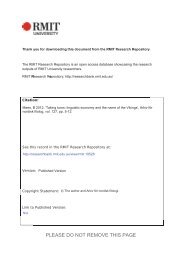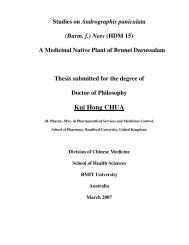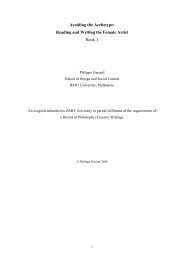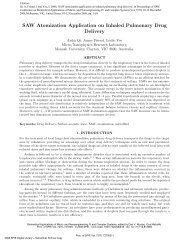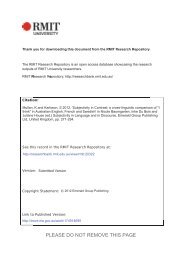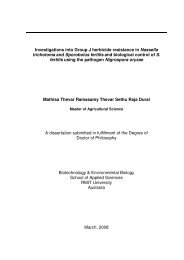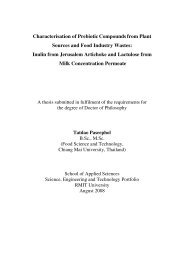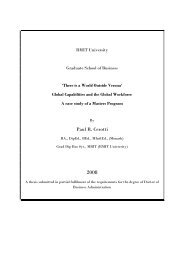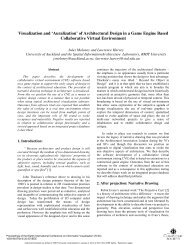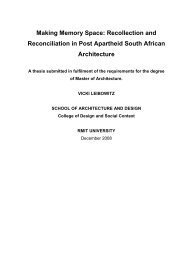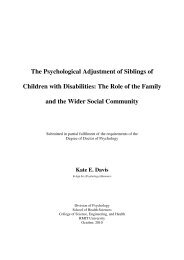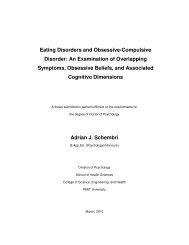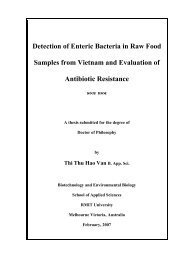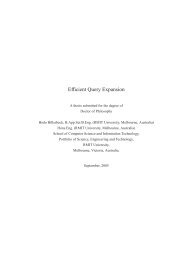Objects in Flux - RMIT Research Repository - RMIT University
Objects in Flux - RMIT Research Repository - RMIT University
Objects in Flux - RMIT Research Repository - RMIT University
Create successful ePaper yourself
Turn your PDF publications into a flip-book with our unique Google optimized e-Paper software.
<strong>Objects</strong> <strong>in</strong> <strong>Flux</strong><br />
16<br />
This understand<strong>in</strong>g – that acts of consumption are, <strong>in</strong> themselves, productive<br />
– has over the past 30 years become widely accepted. As Don<br />
Slater states ‘most of us… are very far from be<strong>in</strong>g m<strong>in</strong>dless consumerist<br />
zombies. We can and do re<strong>in</strong>terpret, transform, rework, recuperate<br />
the material and experiential commodities that are offered us’ (1997,<br />
p. 211). A number of terms have been advanced that seek to better describe<br />
this productive, participatory aspect of consumption; on various<br />
occasions consumers have been recast as prosumers (Toffler, 1970,<br />
1980) and produsers (Bruns, 2007, 2008). The emergence of these<br />
terms should not, however, be taken as <strong>in</strong>dication of a collapse <strong>in</strong> the<br />
b<strong>in</strong>ary division between production and consumption, for although<br />
these terms describe a specific shift <strong>in</strong> the nature of consumption, the<br />
fact rema<strong>in</strong>s that centralised processes of mass-production and their<br />
associated modes of consumption cont<strong>in</strong>ue to dom<strong>in</strong>ate contemporary<br />
capitalist society. That acts of consumption are themselves productive<br />
does not generally alter the power relations that exist with<strong>in</strong> this<br />
dynamic or the subjugated nature of the consumer. While this research<br />
f<strong>in</strong>ds clear <strong>in</strong>dications of <strong>in</strong>dividual agency with<strong>in</strong> acts of consumer<br />
production it also recognises that the field of consumption is a highly<br />
controlled doma<strong>in</strong>. As de Certeau asserts, acts of consumer production<br />
rema<strong>in</strong> cont<strong>in</strong>gent on dom<strong>in</strong>ant economic structures: ‘power relationships<br />
def<strong>in</strong>e the networks <strong>in</strong> which they are <strong>in</strong>scribed and delimit the<br />
circumstances from which they can profit’ (1984, p. 34). As such,<br />
consumers operate <strong>in</strong> a doma<strong>in</strong> that is not their own, yet with<strong>in</strong> this<br />
doma<strong>in</strong> they establish a degree of plurality and creativity; adopt<strong>in</strong>g a<br />
tactical approach, they turn the situation to their own advantage.<br />
In align<strong>in</strong>g the practices of hack<strong>in</strong>g and modd<strong>in</strong>g with de Certeau’s<br />
claim that consumers ‘make someth<strong>in</strong>g’ of the goods and services they<br />
consume, there is a risk of appear<strong>in</strong>g stupidly literal. The ‘mak<strong>in</strong>g’<br />
that concerns de Certeau is of an entirely different order, one based<br />
<strong>in</strong> everyday actions or ‘ways of dwell<strong>in</strong>g’, that ‘shows itself not <strong>in</strong> its<br />
own products (where would it place them?) but <strong>in</strong> an art of us<strong>in</strong>g those<br />
imposed on it’ (1984, p. 31). Yet despite de Certeau’s <strong>in</strong>sistence on<br />
the ‘quasi-<strong>in</strong>visible’ nature of consumer production, everyday acts do<br />
produce material artefacts. De Certeau recognises as much when he<br />
speaks of la perruque (the wig), a practice where employees disguise<br />
their own work as the work of their employer. The products of this



